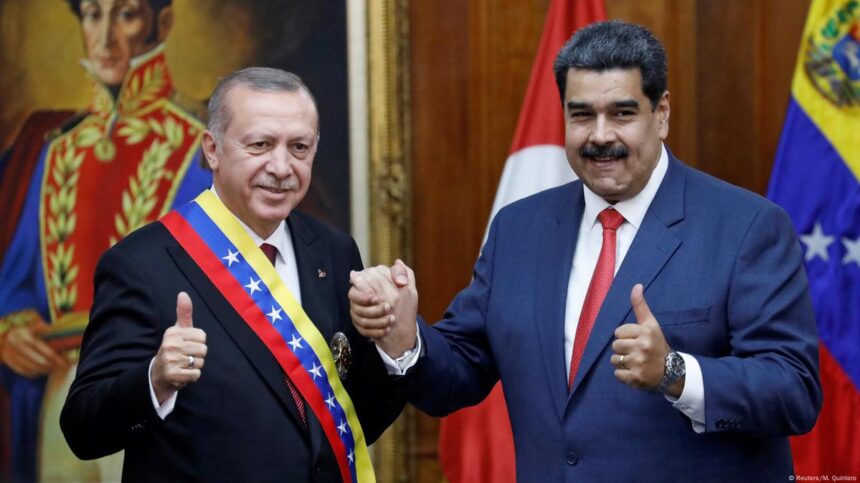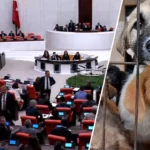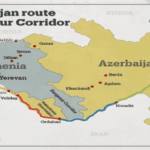Summary by News About Turkey (NAT):
The article examines how Turkish President Erdoğan might respond to an electoral defeat, drawing comparisons to Venezuelan President Maduro’s tactics. It highlights Erdoğan’s centralization of power, control over institutions, and suppression of opposition. The analysis suggests Erdoğan could use state resources and influence to challenge election results, potentially leading to political instability. The piece also discusses possible international reactions and the historical context of similar crises in both Turkey and Venezuela. The overall concern is whether Erdoğan will follow a similar path to maintain power despite electoral losses.
Read more below.
Could Erdogan Follow Maduro’s Path? Examining Potential Responses to Election Defeat in Turkey
Venezuela’s Contested Election Results
Venezuelan President Nicolás Maduro has claimed victory in Sunday’s presidential election, despite independent exit polls showing that challenger Edmundo González received twice as many votes. The United States and several Latin American countries are calling for transparency in the vote-counting process.
Electoral Council’s Announcement
Early Monday, Venezuela’s National Electoral Council, controlled by Maduro, announced that he won 51% of the vote compared to González’s 44%. This contradicts exit polling and partial results indicating a strong lead for González. The opposition has demanded access to all voting records to verify the results.
International Reactions
U.S. Response: U.S. Secretary of State Antony Blinken expressed serious concerns about the announced results and called for the publication of detailed vote tabulations.
Latin American and European Nations: Countries including Colombia, Brazil, Spain, and Italy have expressed skepticism. Brazil is waiting for precinct-level voting data to be published.
Support from Allies: Russia, China, Iran, and Cuba have congratulated Maduro on his victory.
Opposition’s Stance
Opposition leaders, who had prepared extensively to monitor the vote, claim records from 40% of voting centers show their victory. María Corina Machado, a prominent opposition figure, declared Maduro’s win “impossible” and insisted on the truth prevailing.
Election Day Issues
The lead-up to the election saw several irregularities, including the barring of opposition leader Machado from running, arrests of campaign workers, and restricted media access. On election day, there were reports of blocked entries, delays, and violence at voting centers.
Maduro’s Response
Maduro claimed without evidence that a hacking attempt caused a delay in publishing full results, blaming external forces for attempting to disrupt the election process.
Calls for Transparency
Latin American Leaders: Colombia’s foreign minister called for an independent audit, while Chilean President Gabriel Boric demanded access for international observers.
Diverse Political Views: From left-wing to right-wing leaders, there were calls for transparency. Argentine President Javier Milei and Peruvian Foreign Minister Javier González-Olaechea were particularly vocal about recognizing only verifiable results.
Allied Support
Maduro received congratulations from allied countries, with Russian President Vladimir Putin and China’s Foreign Ministry acknowledging the election as successful.
Conclusion
The controversy surrounding Maduro’s claimed victory has led to increased calls for transparency and international scrutiny, with significant divisions in international responses based on political alliances. The opposition remains firm in its stance that the election results do not reflect the will of the Venezuelan people.
Turkey and Venezuella
The political landscapes of Turkey and Venezuela share notable similarities, particularly in how their respective leaders, President Recep Tayyip Erdoğan and President Nicolás Maduro, have maintained their grip on power. Analyzing these parallels provides insight into the argument that Erdoğan might not have accepted an electoral defeat, mirroring Maduro’s response to his own contested election results.
Centralization of Power and Control over Institutions
- Strong Executive Control: Both Erdoğan and Maduro have consolidated power over the executive branch, diminishing the checks and balances typically present in democratic systems. Erdoğan has extended his influence over the judiciary, military, and media, similar to how Maduro controls Venezuela’s National Electoral Council and other key institutions.
- Use of State Resources: Erdoğan and Maduro have both leveraged state resources to bolster their political positions. In Turkey, this has included utilizing state media to promote government narratives and suppress opposition voices. In Venezuela, Maduro has used state mechanisms to control election outcomes and limit opposition activities.
Pre-Election Environment and Tactics
- Suppression of Opposition: Both leaders have taken significant measures to weaken political opposition. In Turkey, opposition leaders and activists have faced arrests, intimidation, and legal challenges, which have undermined their ability to compete fairly. Similarly, in Venezuela, the government has arrested opposition leaders, barred them from running, and restricted their access to the media.
- Election Manipulation: Accusations of election manipulation are common in both countries. In Turkey, there have been claims of irregularities in past elections, such as tampering with ballot boxes and media bias. In Venezuela, Maduro’s elections have been marred by accusations of outright fraud and manipulation of voting data.
Post-Election Responses
- Disputed Results and Refusal to Concede: Maduro’s refusal to accept election results that suggested his defeat is a stark example of how entrenched leaders respond to electoral challenges. Given Erdoğan’s similar consolidation of power and control over institutions, it is plausible to argue that he might also refuse to accept an election loss. The potential for disputed results and refusal to concede is heightened by Erdoğan’s history of contesting unfavorable outcomes and alleging conspiracies against him.
- International Reactions and Isolation: Both leaders face significant international scrutiny and skepticism regarding their commitment to democratic principles. Following contested elections, Erdoğan could experience similar international isolation and condemnation that Maduro faced, especially if the electoral process is perceived as unfair or manipulated.
Historical Precedents
- Handling of Political Crises: Both Erdoğan and Maduro have histories of managing political crises with an iron fist. Erdoğan’s response to the 2016 coup attempt involved a massive purge of military personnel, civil servants, and educators, demonstrating his willingness to take extreme measures to maintain power. Maduro has similarly responded to opposition protests and challenges with severe crackdowns and imprisonment of dissenters.
- Narratives of External Threats: Both leaders often frame their political struggles as battles against external threats and conspiracies, which can be used to justify retaining power despite unfavorable election results. Erdoğan frequently cites foreign interference and internal threats to Turkey’s stability, while Maduro blames economic woes and political unrest on foreign plots.
Conclusion
The political, economic, and social dynamics in Turkey and Venezuela illustrate how leaders with centralized power might react similarly to electoral challenges. Given the parallels in how Erdoğan and Maduro have maintained control and managed opposition, it is reasonable to argue that Erdoğan, faced with an electoral defeat, might respond in a manner akin to Maduro, refusing to accept the results and leveraging his control over state institutions to challenge or invalidate the outcome.
Source: politurco.com



